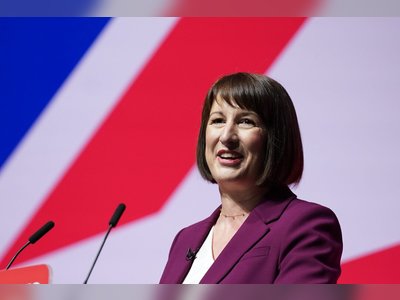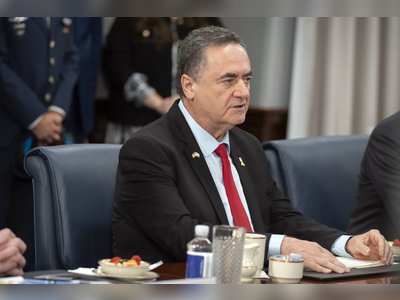Labour Cabinet Faces Tensions Amid Leaks Targeting Female Ministers
Concerns arise in Keir Starmer's cabinet as female ministers report feeling unsafe due to negative briefings.
Last week, tensions escalated within the Labour Party's cabinet as a female minister directly expressed her concerns to Prime Minister Keir Starmer regarding ongoing leaks and negative briefings targeting female colleagues.
The complaints specifically named three prominent women in the cabinet: Education Secretary Bridget Phillipson, Work and Pensions Secretary Liz Kendall, and Home Secretary Yvette Cooper.
Starmer responded with strong condemnation, indicating he would no longer tolerate such malicious briefings and warned of potential consequences if the situation did not improve.
According to one minister, the atmosphere in cabinet has deteriorated to the point where it is perceived as no longer a safe space for open and genuine debate.
However, some sources noted that while personal attacks have intensified, key policy discussions, particularly related to defence spending, have not been leaked.
The discontent surrounding the treatment of female ministers has been growing amid the mounting pressures of their roles, which have involved navigating public discontent over government welfare cuts, immigration issues, and criticism from the opposition regarding educational reforms.
Approximately a dozen female Labour MPs expressed discomfort with the perception that female ministers are disproportionately blamed for various government challenges, although there is a noted lack of sympathy for Chancellor Rachel Reeves due to dissatisfaction with the handling of economic policies.
Among newer Labour MPs, there is a prevailing sentiment that the next leader of the Labour Party should be a woman, countering what they perceive as an effort to position Wes Streeting as Starmer’s successor.
Allies of Streeting, the Health Secretary, refute allegations suggesting he is orchestrating negative briefings against his female counterparts, highlighting his longstanding friendships with Phillipson and Reeves as evidence.
Supporters assert that Streeting is committed to the high demands of his health portfolio and is focused on improving the National Health Service (NHS).
Recently, he positioned himself as a prominent voice for Labour, using media platforms to critique opposing parties and their policies.
For instance, he launched a party by-election campaign in Runcorn by attacking Nigel Farage and denouncing the Reform Party’s potential plans to dismantle the NHS.
Despite his media visibility and perceived rhetorical skills, Streeting has not garnered significant popularity within the grassroots Labour membership, ranking low in internal polls compared to fellow cabinet members.
Popular support among Labour members appears to favor Deputy Prime Minister Angela Rayner, who leads in approval ratings despite the potential for a challenging media landscape if she were to pursue leadership.
Political dynamics in the cabinet continue to fluctuate, particularly following criticisms directed towards ministers over contentious policy decisions, such as Kendall’s internal opposition to welfare cuts and Phillipson’s role in education reforms.
The prevailing climate suggests a complex interplay of loyalty, competition, and the impacts of public perception that significantly shape the ongoing dialogue within the Labour Party and its leadership aspirations.
The complaints specifically named three prominent women in the cabinet: Education Secretary Bridget Phillipson, Work and Pensions Secretary Liz Kendall, and Home Secretary Yvette Cooper.
Starmer responded with strong condemnation, indicating he would no longer tolerate such malicious briefings and warned of potential consequences if the situation did not improve.
According to one minister, the atmosphere in cabinet has deteriorated to the point where it is perceived as no longer a safe space for open and genuine debate.
However, some sources noted that while personal attacks have intensified, key policy discussions, particularly related to defence spending, have not been leaked.
The discontent surrounding the treatment of female ministers has been growing amid the mounting pressures of their roles, which have involved navigating public discontent over government welfare cuts, immigration issues, and criticism from the opposition regarding educational reforms.
Approximately a dozen female Labour MPs expressed discomfort with the perception that female ministers are disproportionately blamed for various government challenges, although there is a noted lack of sympathy for Chancellor Rachel Reeves due to dissatisfaction with the handling of economic policies.
Among newer Labour MPs, there is a prevailing sentiment that the next leader of the Labour Party should be a woman, countering what they perceive as an effort to position Wes Streeting as Starmer’s successor.
Allies of Streeting, the Health Secretary, refute allegations suggesting he is orchestrating negative briefings against his female counterparts, highlighting his longstanding friendships with Phillipson and Reeves as evidence.
Supporters assert that Streeting is committed to the high demands of his health portfolio and is focused on improving the National Health Service (NHS).
Recently, he positioned himself as a prominent voice for Labour, using media platforms to critique opposing parties and their policies.
For instance, he launched a party by-election campaign in Runcorn by attacking Nigel Farage and denouncing the Reform Party’s potential plans to dismantle the NHS.
Despite his media visibility and perceived rhetorical skills, Streeting has not garnered significant popularity within the grassroots Labour membership, ranking low in internal polls compared to fellow cabinet members.
Popular support among Labour members appears to favor Deputy Prime Minister Angela Rayner, who leads in approval ratings despite the potential for a challenging media landscape if she were to pursue leadership.
Political dynamics in the cabinet continue to fluctuate, particularly following criticisms directed towards ministers over contentious policy decisions, such as Kendall’s internal opposition to welfare cuts and Phillipson’s role in education reforms.
The prevailing climate suggests a complex interplay of loyalty, competition, and the impacts of public perception that significantly shape the ongoing dialogue within the Labour Party and its leadership aspirations.










